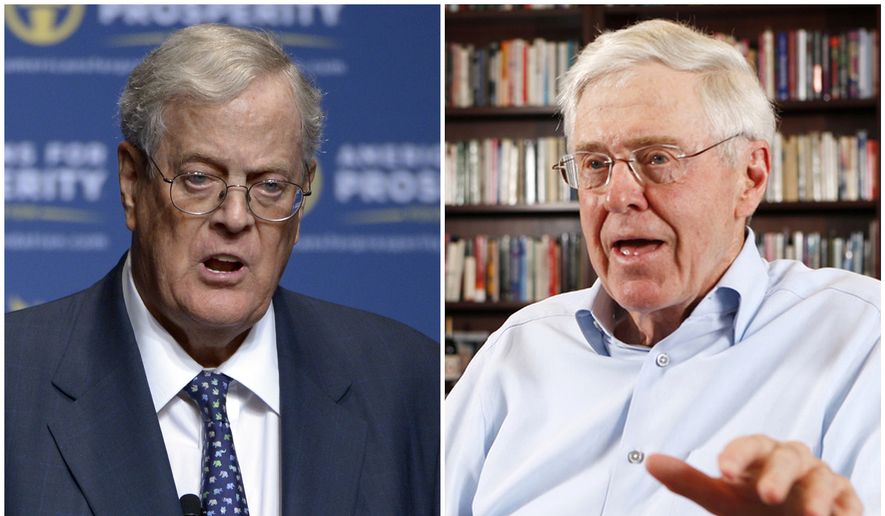
COLORADO SPRINGS, Colo. (AP) — The conservative Koch[1] brothers are no more — even if they remain a political powerhouse.
The Democrats’ super villains for much of the last decade have quietly launched a rebranding effort that may vanquish the “Koch[2] brothers” moniker from American politics. The catalyst came earlier in the year when ailing billionaire conservative David Koch[3] stepped away from the family business, leaving older brother Charles as the undisputed leader of the Kochs’ web of expanding political and policy organizations.
There were already few, if any, clearly identifiable links between the Kochs and their most active spinoff organizations such as Americans for Prosperity, Freedom Partners or the LIBRE Initiative. But in the days after the younger billionaire’s retreat, company officials quickly began pushing journalists across the country to change references from “Koch[4] brothers” in their coverage to “Koch[5] network” or one of their less-recognizable entities.
Asked about the shift on Saturday, Koch[6]’s chief lieutenants explained that 82-year-old Charles Koch was always far more involved with their political efforts than his ailing brother. The elder Koch[7] addressed the shift directly as he welcomed hundreds of donors to an invitation-only summit at a luxury resort in the Rocky Mountains.
“I am not getting weak in the knees. … Truly I am not,” Charles Koch said with a smile. He added: “We’re just getting started.”
Regardless of its name, the conservative network remains one of the nation’s most influential political forces, a conservative powerhouse simultaneously playing the long- and short-game in a way that ensures it will remain a dominant force long after President Donald Trump is gone. And in sharp contrast to the Republican president who is eager to put his name on his accomplishments, the Kochs are happy to do it in the dark.
While much of the network operates out of sight, the Charles Koch Foundation announced Saturday that it would begin publicly posting all multiyear grant agreements with universities. Last year, the foundation gave $90 million for projects on 300 campuses.
An estimated 500 Koch[8] donors — each having committed at least $100,000 annually — gathered for the weekend “seminar” that featured a handful of elected officials and high-profile influencers. As is customary for the bi-annual meetings, guests were required to give up their cell phones during some presentations. And while The Associated Press joined a handful of media organizations allowed to witness some activities, photos and videos were strictly prohibited.
Florida Gov. Rick Scott and Tennessee Rep. Marsha Blackburn, both Republican Senate candidates, led the list of elected officials on hand. Senate Republican whip John Cornyn of Texas, South Carolina Sen. Tim Scott and Kentucky Gov. Matt Bevin were also on the guest list....
The money behind the Kochs’ push to transform education, philanthropy, immigration, health care, tax laws, courts,
